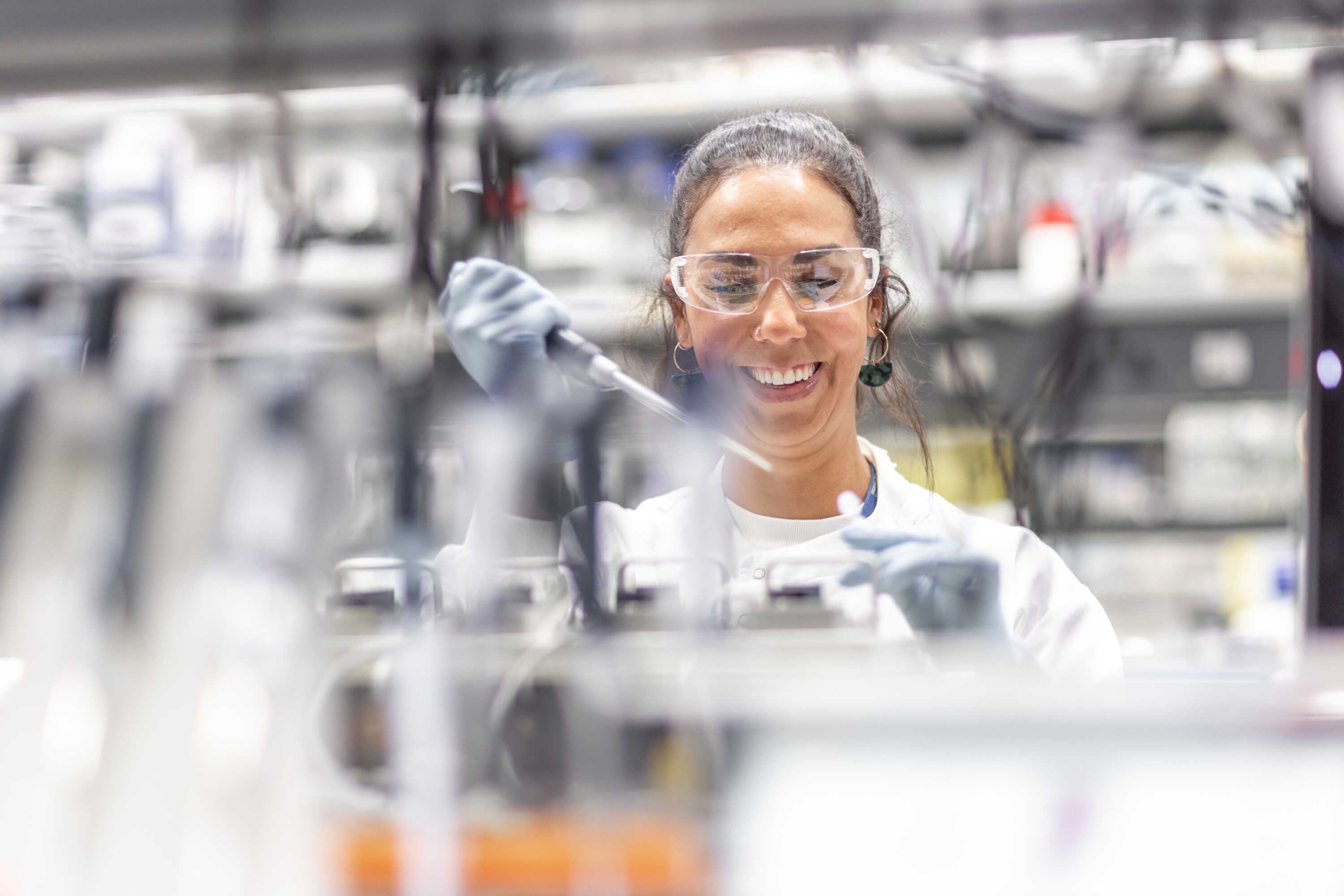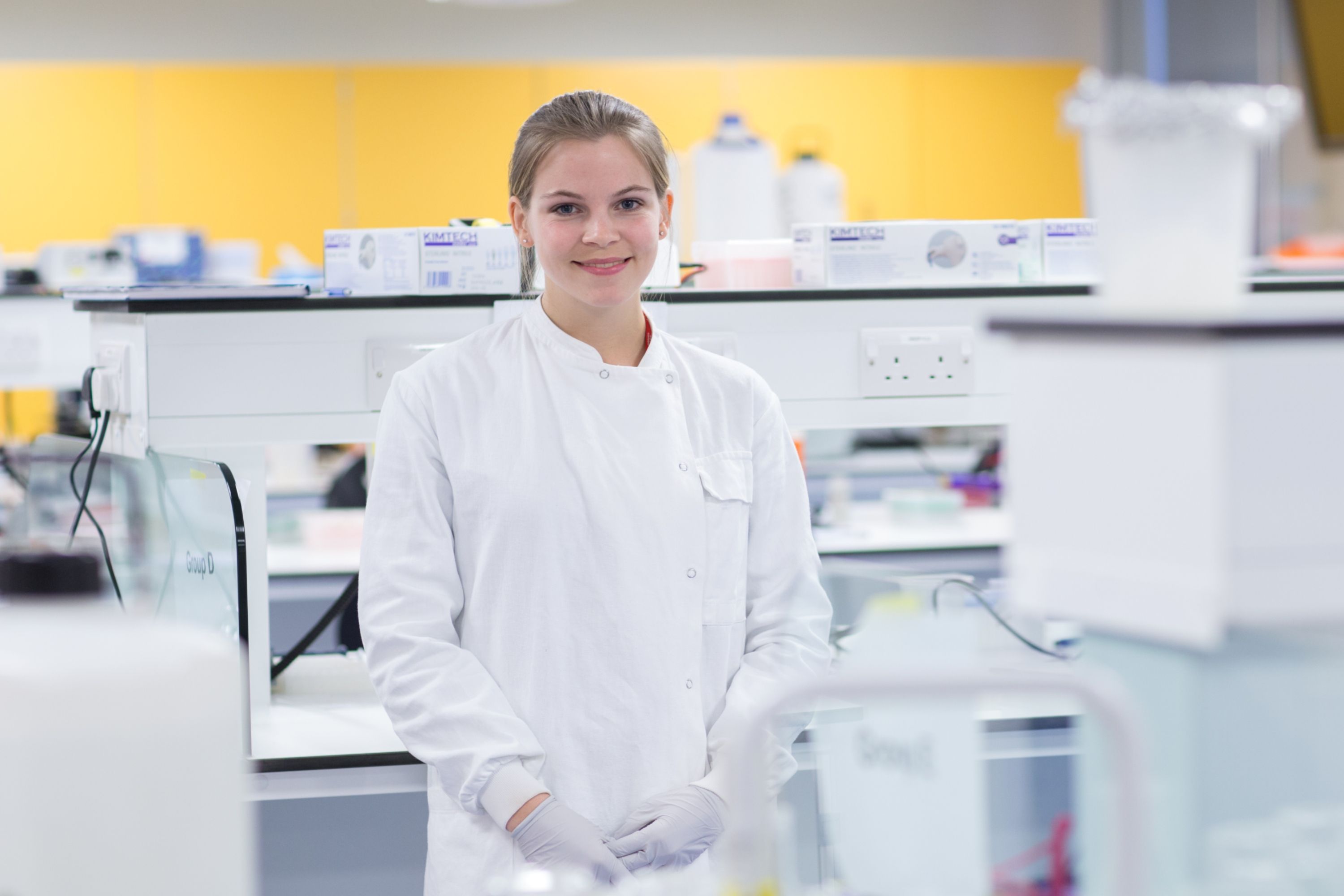.jpg)
Biomedical Research (Respiratory and Cardiovascular Science)
Gain fundamental skills towards a career in biomedical research and build your knowledge of the basic physiology of cardiac function.
Gain fundamental skills towards a career in biomedical research and build your knowledge of the basic physiology of cardiac function
Understand the rationale behind the design of novel treatments for respiratory and cardiovascular disease
Advance your understanding of the physiology and pathophysiology of the heart and lungs on two research projects
Course key facts
Qualification
MRes
Duration
1 year
Start date
September 2025
Study mode
Full-time
-
Fees
£20,600 Home
£45,000 Overseas
Delivered by
Location
-
Hammersmith
-
Royal Brompton
-
Course overview
Specialise in respiratory and cardiovascular science and build your biomedical research skills on this Master's course.
You'll analyse the basic physiology of cardiac function, as well as the pathophysiology of major cardiovascular diseases and major respiratory diseases.
This specialised MRes Biomedical Research stream examines the advantages and limitations of animal models of respiratory and cardiovascular disease.
You'll also explore the rationale behind the design of novel treatments for respiratory and cardiovascular disease and develop your research expertise on two extended projects.
Extensive theoretical and practical skills training will prepare you for employment roles within a biomedical environment, on a programme that incorporates grant writing, technical workshops and journal clubs.
Choose your stream
You have the option of choosing our general biomedical research stream, or one of seven specialisms. All of our biomedical research streams have the same course structure and each stream has its own tailored set of projects alongside a core programme of lectures, seminars and practical classes.
You should consider which stream is right for you according to your career aims and background. If an offer of admission is made, it will correspond to a specific stream. Switching streams is not possible once you have commenced your studies.
- General Biomedical Research
- Anaesthetics, Pain Medicine and Intensive Care
- Bacterial Pathogenesis and Infection
- Data Science
- Epidemiology, Evolution and Control of Infectious Diseases
- Microbiome in Health and Disease
- Molecular Basis of Human Disease
- Respiratory and Cardiovascular Science (this stream)
Is this stream for you?
This stream is aimed at students with a biological or biochemical background wishing to pursue further education in a biomedically relevant area and those that want to undertake research projects aimed at understanding pathophysiological mechanisms underlying respiratory and/or cardiovascular diseases.
It is also aimed at students who want to gain a Master’s qualification with a view to undertaking doctoral training, or work in the pharmaceutical industry or in a professional biomedical technical environment.
This stream is delivered by the Department of Metabolism, Digestion and Reproduction in collaboration with the National Heart and Lung Institute.
Structure
This page is updated regularly to reflect the latest version of the curriculum. However, this information is subject to change.
Find out more about potential course changes.
Please note: it may not always be possible to take specific combinations of modules due to timetabling conflicts. For confirmation, please check with the relevant department.
You’ll take all of these core modules.
Core modules
Compose a grant proposal, appropriate for submission to an academic funding body.
This will correspond to your research project(s).
You'll carry out two mini research projects, exploring some of the most technologically advanced approaches currently being applied to biomedical research.
You have a wide range of research projects available to you.
The projects available to you are determined by your chosen stream.
You can also choose projects from other streams, though you will only have priority within your own stream.
Example projects
- Characterisation of lung pericytes and how inflammation can shape them
- The role of mitochondrial dynamics in cardiac inflammatory phenotype
- Identification of the miRNA markers of cardiac fibrosis from heart failure patients using new nanopore technology
- Investigating the role of MAP4 and microtubule dynamics in heart failure.
- How does PDE4B involve in the β2AR-cAMP compartmentation during hypoosmotic stress?
- A systematic review and meta-analysis of trial evidence evaluating behavioural interventions to reduce asthma symptoms
- Interactions of Immune Sub-populations with Cardiac Cell Types in Post-Infarct Human and Mouse Hearts
- Role of sympathetic neurons in regulating cardiomyocyte conductance and electrical properties.
- Aspergillus-specific immune responses in chronic respiratory disease
- Characterization of MSC-derived exosomes from 3D culture systems
See a full list of example Biomedical research projects on the Department of Metabolism, Digestion and Reproduction web pages.
Teaching and assessment
Teaching and learning methods
-
Demonstrations and seminars
-
Workshops
-
Computing labs
-
Journal clubs
-
Virtual learning environment
-
Tutorials
-
Lab-based learning
-
Facility Tours
-
Lectures
-
Debates
Balance of assessment
Key
- Grant writing exercise
- Research projects
- 10% Grant writing exercise
- 90% Research projects
Assessment methods
-
Laboratory-based research
-
Computer-based research
-
Oral presentation
-
Poster presentation
-
Research reports
-
Oral assessment
Entry requirements
We consider all applicants on an individual basis, welcoming students from all over the world.
2:1 in an appropriate subject.
How to apply
Apply online
You can submit one application form per year of entry. You can choose up to two courses.
In our application system My Imperial, you will need to choose Biomedical Research (MRes 1YFT) in the Programme selection search. After this, you will be asked to choose the stream you wish to be considered for.
The Department's Biomedical Research Admissions FAQ provides more details about applying for the course.
There is no application fee for MRes courses, Postgraduate Certificates, Postgraduate Diplomas or research courses, such as PhDs and EngDs.
Find out more about how to apply for a Master's course, including references and personal statements.
An ATAS certificate is not required for students applying for this course.
Fees and funding
Home fee
2025 entry
£20,600
You should expect and budget for your fees to increase each year.
Your fee is based on the year you enter the university, not your year of study. This means that if you repeat a year or resume your studies after an interruption, your fees will only increase by the amount linked to inflation.
Find out more about our tuition fees payment terms, including how inflationary increases are applied to your tuition fees in subsequent years of study.
Whether you pay the Home or Overseas fee depends on your fee status. This is assessed based on UK Government legislation and includes things like where you live and your nationality or residency status. Find out how we assess your fee status.
If you're a UK national, or EU national with settled or pre-settled status under the EU Settlement Scheme, you may be able to apply for a Postgraduate Master’s Loan from the UK government, if you meet certain criteria.
For courses starting on or after 1 August 2024, the maximum amount is £12,471.
The loan is not means-tested and you can choose whether to put it towards your tuition fees or living costs.
We offer a range of scholarships for students to support you through your studies.
See what opportunities you may be eligible for on our dedicated Scholarships search tool.
Scholarships
The Dean’s Master’s Scholarships
Value per award
- £10,000
Who it's for
- All students applying to study a Faculty of Medicine Master’s course
The Dr Jean Alero Thomas Scholarships
Value per award
- Partial or full tuition fee at the Home rate
Who it's for
- All students applying to study a Faculty of Medicine lab-based Master’s course
Department of Metabolism, Digestion and Reproduction Bursaries
Value per award
- £2,000 (full-time) or £1,000 per year (part-time, two-years)
Who it's for
- Offer holders for the department's MSc/MRes courses
How will studying at Imperial help my career?
Strengthen your career prospects as aspiring Anaesthetists and Intensive Care physicians.
Cultivate a robust network within an inclusive Division, fostering valuable connections with academics and clinicians.
Participate in Departmental Research symposia, offering exposure, critical appraisal skills, expert engagement, and staying updated in the field.
Develop key academic skills to support your progress to PhD or medical school.
Develop essential soft skills, such as communication, teamwork, and adaptability, crucial for success in professional healthcare environments.
Get support with grant applications and publication of research findings, enriching academic and professional portfolios.
Participate in Departmental Research symposia, offering exposure, critical appraisal skills, expert engagement, and staying updated in the field.
Further links
Contact the department
Email: biomedical.researchmres@imperial.ac.uk
Course Director: Professor Tim Ebbels
Course Deputy Director: Dr Elizabeth Want
Stream Organiser: Dr Nicholas Kirkby
Visit the Department of Metabolism, Digestion and Reproduction website.

Our students
Meet Biomedical Research students and see what they have to say about their studies.
You can also read more about our student achievements, including funding, publications and academic prizes.

Register your interest
Stay up to date on news, events, scholarship opportunities and information related to this course.

Events, tasters and talks
Meet us and find out more about studying at Imperial.

Terms and conditions
There are some important pieces of information you should be aware of when applying to Imperial. These include key information about your tuition fees, funding, visas, accommodation and more.
You can find further information about your course, including degree classifications, regulations, progression and awards in the programme specification for your course.
Programme specifications